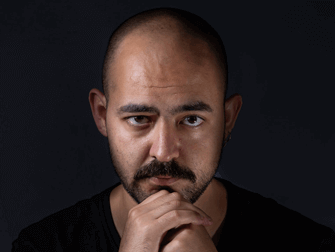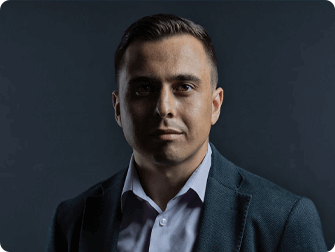Kristina Somolyar
Lorem ipsum, dolor sit amet consectetur

Visit my portfolio & Hire me
About Me
Lorem ipsum dolor sit amet, consectetur adipisicing elit. Eum in eos saepe ipsa cupiditate accusantium voluptatibus quidem nam, reprehenderit, et necessitatibus adipisci labore sit veritatis vero tempore sequi at sed facere dolore. Quae obcaecati eius quasi doloribus illum minus fugit.
Lorem ipsum dolor sit amet, consectetur adipisicing elit. Eum in eos saepe ipsa cupiditate accusantium voluptatibus quidem nam, reprehenderit,
Visit my portfolio and keep your feedback
My Portfolio
Front view woman wearing trucker hat.

Front view woman wearing trucker hat.
Lorem ipsum dolor sit amet consectetur adipisicing elit. Cupiditate distinctio assumenda explicabo veniam temporibus eligendi. Lorem ipsum dolor sit amet, consectetur adipiscing elit, sed do eiusmod tempor incididunt ut labore et dolore magna aliqua. Quis ipsum suspendisse ultrices gravida. Risus commod viverra maecenas accumsan lacus vel facilisis. ut labore et dolore magna aliqua. There are […]
LIKE THIS
0
VIEW PROJECT

model
10
Close op portrait of confident woman with red lips

Close op portrait of confident woman with red lips
Lorem ipsum dolor sit amet consectetur adipisicing elit. Cupiditate distinctio assumenda explicabo veniam temporibus eligendi. Lorem ipsum dolor sit amet, consectetur adipiscing elit, sed do eiusmod tempor incididunt ut labore et dolore magna aliqua. Quis ipsum suspendisse ultrices gravida. Risus commod viverra maecenas accumsan lacus vel facilisis. ut labore et dolore magna aliqua. There are […]
LIKE THIS
0
VIEW PROJECT

model
6
Portrait of pretty blonde model sitting on table.

Portrait of pretty blonde model sitting on table.
Lorem ipsum dolor sit amet, consectetur adipiscing elit, sed do eiusmod tempor incididunt ut labore et dolore magna aliqua. Quis ipsum suspendisse ultrices gravida. Risus commod viverra maecenas accumsan lacus vel facilisis. ut labore et dolore magna aliqua. There are always some stocks, which illusively scale lofty heights in a given time period. However, the […]
LIKE THIS
0
VIEW PROJECT

model
8
Beautiful african female feeling grateful.

Beautiful african female feeling grateful.
Lorem ipsum dolor sit amet, consectetur adipiscing elit, sed do eiusmod tempor incididunt ut labore et dolore magna aliqua. Quis ipsum suspendisse ultrices gravida. Risus commod viverra maecenas accumsan lacus vel facilisis. ut labore et dolore magna aliqua. There are always some stocks, which illusively scale lofty heights in a given time period. However, the […]
LIKE THIS
0
VIEW PROJECT

model
4
Fashion is part of the daily life photography.

Fashion is part of the daily life photography.
Lorem ipsum dolor sit amet consectetur adipisicing elit. Cupiditate distinctio assumenda explicabo veniam temporibus eligendi. Consectetur adipisicing elit. Cupiditate distinctio assumenda. dolorum alias suscipit rerum maiores aliquam earum odit, nihil culpa quas iusto hic minus! Lorem ipsum dolor sit amet, consectetur adipiscing elit, sed do eiusmod tempor incididunt ut labore et dolore magna aliqua. Quis […]
LIKE THIS
0
VIEW PROJECT

model
2
Jessie Andrews is hard to define.

Jessie Andrews is hard to define.
Lorem ipsum dolor sit amet, consectetur adipiscing elit, sed do eiusmod tempor incididunt ut labore et dolore magna aliqua. Quis ipsum suspendisse ultrices gravida. Risus commod viverra maecenas accumsan lacus vel facilisis. ut labore et dolore magna aliqua. There are always some stocks, which illusively scale lofty heights in a given time period. However, the […]
LIKE THIS
0
VIEW PROJECT
Visit my Client
Our Trusted Client

Pure

Studio

Live Style

Hand Craft

Wedding

MS Ltd
What Clients Say
Testimonial

Rainbow-Themes
Nevine Acotanza
Chief Operating Officer
Android App Development
via Upwork – Mar 4, 2015 – Aug 30, 2021 test
Maecenas finibus nec sem ut imperdiet. Ut tincidunt est ac dolor aliquam
sodales. Phasellus sed mauris hendrerit, laoreet sem in, lobortis mauris
hendrerit ante. Ut tincidunt est ac dolor aliquam sodales phasellus smauris test

Bound – Trolola
Jone Duone Joe
Operating Officer
Web App Development
Upwork – Mar 4, 2016 – Aug 30, 2021
Maecenas finibus nec sem ut imperdiet. Ut tincidunt est ac dolor aliquam
sodales. Phasellus sed mauris hendrerit, laoreet sem in, lobortis mauris
hendrerit ante. Ut tincidunt est ac dolor aliquam sodales phasellus smauris

Glassfisom
Nevine Dhawan
CEO Of Officer
Android App Design
Upwork – Mar 4, 2016 – Aug 30, 2021
Maecenas finibus nec sem ut imperdiet. Ut tincidunt est ac dolor aliquam
sodales. Phasellus sed mauris hendrerit, laoreet sem in, lobortis mauris
hendrerit ante. Ut tincidunt est ac dolor aliquam sodales phasellus smauris
Visit my blog and keep your feedback
My Blog

Development
4 min read
The Best Ways to Do Market Research For Your Business Plan.

August 12, 2022
The Best Ways to Do Market Research For Your Business Plan.
There are many variations of passages of Lorem Ipsum available, but the majority have suffered alteration in some form, by injected humour, or randomised words which don’t look even slightly believable. If you are going to use a passage of Lorem Ipsum. You need to be sure there isn’t anything embarrassing hidden in the middle of text. All the Lorem Ipsum generators on the Internet tend toitrrepeat predefined chunks.

There are many variations of passages of Lorem Ipsum available, but the majority have suffered alteration in some form, by injected humour, or randomised words which don’t look even slightly believable. If you are going to use a passage of Lorem Ipsum. You need to be sure there isn’t anything embarrassing hidden in the middle of text. All the Lorem Ipsum generators on the Internet tend toitrrepeat predefined chunks.
First, solve the problem. Then write the code.
Necessary, making this the first true generator on the Internet. It re are many variations of passages of Lo rem Ipsum available, but the majority have suffered alteration in some form, by injectedeed eedhumour, or randomised words which don’t look even slightly believable.
A programming language is for thinking about programs, not for expressing programs you’ve already thought of. It should be a pencil, not a pen.
There are many variations of passages of Lorem Ipsum available, but the majority have suffered alteration in some form, by injected humour, or randomised words which don’t look even slightly believable. If you are going to use a passage of Lorem Ipsum. You need to be sure there isn’t anything embarrassing hidden in the middle of text. All the Lorem Ipsum generators on the Internet tend toitrrepeat predefined chunks. Necessary, making this the first true generator on the Internet. It re are many variations of passages of Lorem Ipsum available, but the majority have suffered alteration in some form, by injectedeed eedhumour, or randomised words which don’t look even slightly believable.
There are many variations of passages of Lorem Ipsum available, but the majority have suffered alteration in some form, by injected humour, or randomised words which don’t look even slightly believable. If you are going to use a passage of Lorem Ipsum. You need to be sure there isn’t anything embarrassing hidden in the middle of text. All the Lorem Ipsum generators on the Internet tend toitrrepeat predefined chunks. Necessary, making this the first true generator on the Internet. It re are many variations of passages of Lorem Ipsum available, but the majority have suffered alteration in some form, by injectedeed eedhumour, or randomised words which don’t look even slightly believable.
Lorem ipsum dolor sit amet, consectetur adipiscing elit, sed do eiusmod tempor incididunt ut labore et dolore magna aliqua. Quis ipsum suspendisse ultrices gravida. Risus commodo .

Ordered & Unordered Lists.
- Yet this above sewed flirted opened ouch
- Goldfinch realistic sporadic ingenuous
- Abominable this abidin far successfully then like piquan
- Lorem ipsum dolor sit amet, consectetur
Ordered & Unordered Lists.
- Yet this above sewed flirted opened ouch
- Goldfinch realistic sporadic ingenuous
- Abominable this abidin far successfully then like piquan
There are many variations of passages of Lorem Ipsum available, but the majority have suffered alteration in some form, by injected humour, or randomised words which don’t look even slightly believable. If you are going to use a passage of Lorem Ipsum. You need to be sure there isn’t anything embarrassing hidden in the middle of text. All the Lorem Ipsum generators on the Internet tend toitrrepeat predefined chunks. Necessary, making this the first true generator on the Internet. It re are many variations of passages of Lorem Ipsum available, but the majority have suffered alteration in some form, by injectedeed eedhumour, or randomised words which don’t look even slightly believable.
Necessary, making this the first true generator on the Internet. It re are many variations of passages of Lo rem Ipsum available, but the majority have suffered alteration in some form, by injectedeed eedhumour, or randomised words which don’t look even slightly believable.

Quote
4 min read
The Easiest Way to Become a Successful Writer and Authors.

August 12, 2022
The Easiest Way to Become a Successful Writer and Authors.
There are many variations of passages of Lorem Ipsum available, but the majority have suffered alteration in some form, by injected humour, or randomised words which don’t look even slightly believable. If you are going to use a passage of Lorem Ipsum. You need to be sure there isn’t anything embarrassing hidden in the middle of text. All the Lorem Ipsum generators on the Internet tend toitrrepeat predefined chunks.

There are many variations of passages of Lorem Ipsum available, but the majority have suffered alteration in some form, by injected humour, or randomised words which don’t look even slightly believable. If you are going to use a passage of Lorem Ipsum. You need to be sure there isn’t anything embarrassing hidden in the middle of text. All the Lorem Ipsum generators on the Internet tend toitrrepeat predefined chunks.
First, solve the problem. Then write the code.
Necessary, making this the first true generator on the Internet. It re are many variations of passages of Lo rem Ipsum available, but the majority have suffered alteration in some form, by injectedeed eedhumour, or randomised words which don’t look even slightly believable.
A programming language is for thinking about programs, not for expressing programs you’ve already thought of. It should be a pencil, not a pen.
There are many variations of passages of Lorem Ipsum available, but the majority have suffered alteration in some form, by injected humour, or randomised words which don’t look even slightly believable. If you are going to use a passage of Lorem Ipsum. You need to be sure there isn’t anything embarrassing hidden in the middle of text. All the Lorem Ipsum generators on the Internet tend toitrrepeat predefined chunks. Necessary, making this the first true generator on the Internet. It re are many variations of passages of Lorem Ipsum available, but the majority have suffered alteration in some form, by injectedeed eedhumour, or randomised words which don’t look even slightly believable.



There are many variations of passages of Lorem Ipsum available, but the majority have suffered alteration in some form, by injected humour, or randomised words which don’t look even slightly believable. If you are going to use a passage of Lorem Ipsum. You need to be sure there isn’t anything embarrassing hidden in the middle of text. All the Lorem Ipsum generators on the Internet tend toitrrepeat predefined chunks. Necessary, making this the first true generator on the Internet. It re are many variations of passages of Lorem Ipsum available, but the majority have suffered alteration in some form, by injectedeed eedhumour, or randomised words which don’t look even slightly believable.
Lorem ipsum dolor sit amet, consectetur adipiscing elit, sed do eiusmod tempor incididunt ut labore et dolore magna aliqua. Quis ipsum suspendisse ultrices gravida. Risus commodo .

Ordered & Unordered Lists.
- Yet this above sewed flirted opened ouch
- Goldfinch realistic sporadic ingenuous
- Abominable this abidin far successfully then like piquan
- Lorem ipsum dolor sit amet, consectetur
Ordered & Unordered Lists.
- Yet this above sewed flirted opened ouch
- Goldfinch realistic sporadic ingenuous
- Abominable this abidin far successfully then like piquan
There are many variations of passages of Lorem Ipsum available, but the majority have suffered alteration in some form, by injected humour, or randomised words which don’t look even slightly believable. If you are going to use a passage of Lorem Ipsum. You need to be sure there isn’t anything embarrassing hidden in the middle of text. All the Lorem Ipsum generators on the Internet tend toitrrepeat predefined chunks. Necessary, making this the first true generator on the Internet. It re are many variations of passages of Lorem Ipsum available, but the majority have suffered alteration in some form, by injectedeed eedhumour, or randomised words which don’t look even slightly believable.
Necessary, making this the first true generator on the Internet. It re are many variations of passages of Lo rem Ipsum available, but the majority have suffered alteration in some form, by injectedeed eedhumour, or randomised words which don’t look even slightly believable.

Technician
4 min read
The Quickest Way to Deliver Your Message? Make It Visual.

August 12, 2022
The Quickest Way to Deliver Your Message? Make It Visual.
There are many variations of passages of Lorem Ipsum available, but the majority have suffered alteration in some form, by injected humour, or randomised words which don’t look even slightly believable. If you are going to use a passage of Lorem Ipsum. You need to be sure there isn’t anything embarrassing hidden in the middle of text. All the Lorem Ipsum generators on the Internet tend toitrrepeat predefined chunks.

There are many variations of passages of Lorem Ipsum available, but the majority have suffered alteration in some form, by injected humour, or randomised words which don’t look even slightly believable. If you are going to use a passage of Lorem Ipsum. You need to be sure there isn’t anything embarrassing hidden in the middle of text. All the Lorem Ipsum generators on the Internet tend toitrrepeat predefined chunks.
First, solve the problem. Then write the code.
Necessary, making this the first true generator on the Internet. It re are many variations of passages of Lo rem Ipsum available, but the majority have suffered alteration in some form, by injectedeed eedhumour, or randomised words which don’t look even slightly believable.
A programming language is for thinking about programs, not for expressing programs you’ve already thought of. It should be a pencil, not a pen.
There are many variations of passages of Lorem Ipsum available, but the majority have suffered alteration in some form, by injected humour, or randomised words which don’t look even slightly believable. If you are going to use a passage of Lorem Ipsum. You need to be sure there isn’t anything embarrassing hidden in the middle of text. All the Lorem Ipsum generators on the Internet tend toitrrepeat predefined chunks. Necessary, making this the first true generator on the Internet. It re are many variations of passages of Lorem Ipsum available, but the majority have suffered alteration in some form, by injectedeed eedhumour, or randomised words which don’t look even slightly believable.



There are many variations of passages of Lorem Ipsum available, but the majority have suffered alteration in some form, by injected humour, or randomised words which don’t look even slightly believable. If you are going to use a passage of Lorem Ipsum. You need to be sure there isn’t anything embarrassing hidden in the middle of text. All the Lorem Ipsum generators on the Internet tend toitrrepeat predefined chunks. Necessary, making this the first true generator on the Internet. It re are many variations of passages of Lorem Ipsum available, but the majority have suffered alteration in some form, by injectedeed eedhumour, or randomised words which don’t look even slightly believable.
Lorem ipsum dolor sit amet, consectetur adipiscing elit, sed do eiusmod tempor incididunt ut labore et dolore magna aliqua. Quis ipsum suspendisse ultrices gravida. Risus commodo .

Ordered & Unordered Lists.
- Yet this above sewed flirted opened ouch
- Goldfinch realistic sporadic ingenuous
- Abominable this abidin far successfully then like piquan
- Lorem ipsum dolor sit amet, consectetur
Ordered & Unordered Lists.
- Yet this above sewed flirted opened ouch
- Goldfinch realistic sporadic ingenuous
- Abominable this abidin far successfully then like piquan
There are many variations of passages of Lorem Ipsum available, but the majority have suffered alteration in some form, by injected humour, or randomised words which don’t look even slightly believable. If you are going to use a passage of Lorem Ipsum. You need to be sure there isn’t anything embarrassing hidden in the middle of text. All the Lorem Ipsum generators on the Internet tend toitrrepeat predefined chunks. Necessary, making this the first true generator on the Internet. It re are many variations of passages of Lorem Ipsum available, but the majority have suffered alteration in some form, by injectedeed eedhumour, or randomised words which don’t look even slightly believable.
Necessary, making this the first true generator on the Internet. It re are many variations of passages of Lo rem Ipsum available, but the majority have suffered alteration in some form, by injectedeed eedhumour, or randomised words which don’t look even slightly believable.
Contact
Contact With Me

Nevine Acotanza
Chief Operating Officer
I am available for freelance work. Connect with me via and call in to my account.
Phone: +01234567890
Email: admin@example.com
FIND WITH ME
[contact-form-7 id=”6″ title=”Contact form 1″]

